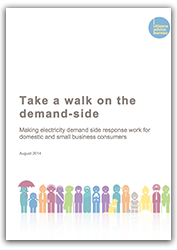Take a walk on the demand side

Making electricity demand side response work for domestic and small business consumers
Take a walk on the demand side 841 KB
'Take a walk on the demand side' examines demand-side response (DSR) – defined by Ofgem as ‘customers responding to a signal to change the amount of energy they consume from the grid at a particular time’ – from a domestic and small-business consumer perspective. Drawing together the latest experience from GB and internationally with original analysis and consumer insight, this paper sets out a vision of how over the next few years DSR can be made to work for consumers.
Already many larger industrial and commercial energy consumers and some households take part in DSR. But new developments such as the smart meter roll-out mean it is likely that DSR will become more prevalent and more complex. According to the Government’s latest impact assessment of the smart meter roll-out, 20 per cent of households might be taking part in DSR by 2020.
The expansion of DSR could deliver a welcome saving on consumer’s electricity bills. However, it potentially complicates the way consumers buy electricity and brings with it associated risks. It may be that DSR can make electricity more affordable, but it must also be accessible, safe and fair. This paper makes 12 detailed recommendations about how the foundations for this can be laid at this early stage. They point towards three priorities for future action by the industry and Government in this area:
Information provision and the comparability of DSR offers will be key and more work is needed to provide consumers with the tools they need in order to make a choice.
When it comes to the risks presented by DSR, attitudes of ‘wait and see’ or ‘buyer beware’ will not be enough. Proactive protections need to be put in place to safeguard consumers from financial or other detriment.
The impact on different vulnerable consumer groups needs to be considered, first to ensure that they are not negatively affected by DSR, and second to empower them to share in its benefits.